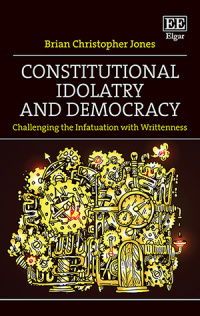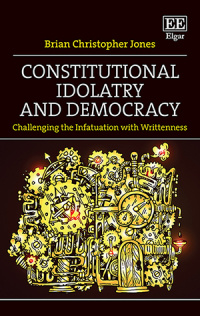2. Brian Christopher Jones, Constitutional Idolatry and Democracy: Challenging the Infatuation with Writtenness (Elgar, 2020

by Walter Horn

Brian Christopher Jones, Constitutional Idolatry and Democracy: Challenging the Infatuation with Writtenness
You’re on your way to your eighth high school volleyball game this month. Although the trip to the school where your daughter will be playing is less than five miles away from your house, you see a couple of dozen American flags on the way, a few on poles, the rest angling up from above front doors. Shortly after your arrival at the gym, you’ll be required to doff your hat and stand through one more performance of the “Star-Spangled Banner,” either by a brass band recorded in 1967 and reproduced on some sort of squawk box or sung by a junior who hopes to major in drama at SUNY Purchase. Presumably, the vast majority of houses you passed on the way to this school are occupied by Americans. And the people playing in and attending this game are also predominantly fellow countrymen and women of yours. So, you’re not learning anything about anybody’s citizenship when you see their flag or watch their reaction to this anthem. After all, you’re not at the Olympics, you’re attending a regional conference game occurring in a Massachusetts public high school. So, what is the purpose of these constant reminders of what country you’re in?
Overt displays of patriotism of the type described above seem to be exhibitions of a kind of temporal worship. A significant segment of the citizenry of every country on earth seems to feel a pressing need to idealize their homeland in public, and they may not just want others to see that they are among the proudest residents: they may also harbor suspicions about those who are less overt with their own patriotic practices. In his illuminating Constitutional Idolatry and Democracy. [1] Brian Christopher Jones points out that constitutions, particularly written ones, are right up there with flags and anthems as popular objects of secular adoration. And here, too, a certain measure of peer pressure seems to be involved. Jones mentions the huge uptick in sales of copies of the U.S. Constitution after Khizr Khan, the father of an American soldier who died in Iraq, pulled a miniature copy from his pocket and waved it around at the 2016 Democratic convention. This was not the first time that little paperback editions of the U.S. Constitution became hot sellers after a national TV “moment.” Those a bit older than Jones may remember that a similar effect was produced when North Carolina Senator Sam Ervin drew his trusty mini-Constitution from his own breast pocket during the Watergate hearings. It was hard to tell which was more weather-beaten and plainly incorruptible—the pint-sized gospel or the Dixie politician himself. For who could doubt that keeping such a book by one’s heart is ample proof of a patriotic sagacity matching that of the old devil-defeater, Daniel Webster himself? And true believers seem to have an unshakeable faith that their activities will always be righteous—even attacking (or calling for an attack on) the U.S Capitol to prevent the counting of Electoral College votes (a tally that very document requires!)—so long as each deed or encouragement is undertaken in the name of the holy national writ.
Jones is therefore certainly right to be wary of treating constitutions—even particularly long-lived ones like the U.S. version—with too much reverence. But he wants to be fair. He considers a number of possible benefits that might follow upon that sort of devotion. Perhaps it is educative; maybe it ensures additional rights protections or is required by authentic democracies. But he finds little or no evidence of beneficial effects of constitutional idolatry on any front. Rather, religious treatment makes for foundations that seem above criticism and that are consequently extremely hard to assess impartially and amend when necessary. In spite of these wants, constitutions of every description have long been treated as scripture, whether or not they (or the nations that have promulgated them) exemplify—or even promise—fair democratic procedures or the sorts of protections usually associated with bills of rights. And Jones points out that the disposition of citizens to worship constitutions is no accident. The authors of or agitators for these documents have often made explicit appeal to such tendencies, especially within the pages of their documents' (often particularly schmaltzy) preambles. We, the people, [not infrequently with the help of the Almighty]in order to make everybody [often some special subgroup, actually] prosperous, safe and deliriously happy, do hereby pronounce THUS and also SO. It should therefore be no great surprise when the people so anointed respond with reverence just as intended, even if in reality their government is no more democratic or freedom-respecting than Turkey’s. [2]
Jones does not stop with a critique of the alleged benefits of constitutional worship. He has doubts about the value provided by the constitutions themselves, particularly written ones. There have long been democrats in the tradition leading to such theorists as Jeremy Waldron and Mark Tushnet who are wary of any foundational law that seems contrary to the ability of groups to get what they want by political means. But Jones distinguishes himself from many in that school by arguing that it is the writtenconstitutions that are most nefarious. The case he makes for this theory seems to me a bit hazy, however. The idea is that written constitutions will be more inclined to engender continual opposition to majoritarian parliamentary procedures than normal laws will, even when the latter are instances of “primary legislation." [3] But it is not obvious to me either that a written constitution must be antithetical to even the most radical of democracies or that an unwritten one must be sympathetic to parliamentary majoritarianism. If we can make the distinction between written and unwritten, we can also make the distinction between primary and ordinary. And legislation (or parliamentary rules, like the U.S. Senate Filibuster) of any type can be written down (or printed out). Could not the UK “primary legislation” be memorialized in a written document that allows for precisely the same sort of easy amendment, deletion and addition that is now available in Britain? And can we not also imagine the U.S. Constitution, even with its absurdly difficult amendment procedures, as some sort of unwritten norm or “primary legislation,” a bunch of foundational rules that were never promulgated via any “Miracle in Philadelphia”? Jones seems to think we cannot, but it’s not entirely clear why. He gives the UK, Australia and New Zealand credit for long-standing constitution-style democracy and rights protections without the need of holy writ, and also rattles off numerous examples of written constitutions that have been altered frequently since their original promulgation. In any case, whether or not avoiding a written gospel makes for better governments is an empirical question, about which Jones may be quite right. The problem is that in order to make this determination, one will have to settle upon what makes for a preferable polity. And, of course, it doesn’t much matter what either variety of constitution says: what counts is what it actually accomplishes (if anything) and whether that thing is something that is really wanted. For both written and unwritten constitutions may make promises to “the people” that are never kept. Indeed, some of these are promises that were never for a moment even intended to be kept.
The point I’m trying to make is that even political theorists who do not idealize constitutions must exalt something, or they will not be able either to endorse or to frown upon any sort of governmental set-up. Jones is never entirely explicit about what he believes to be the essential goods we should look for in a foundational law, but it is possible to infer that the customary liberal characteristics graded by such entities as Freedom House are his goals too: stability, procedurally fair democracy, not too much income disparity, due process of law, non-discrimination, security of the populace from both their government and other residents, etc. And his broad knowledge of both current and past constitutions around the world makes him an excellent guide through many thickets of useless faux-doctrines one can find on every continent. But, perhaps because of his reluctance to say precisely how we want our governments to behave, he is not always careful to distinguish between very different sorts of merits that constitutions may have. E.g., there are the clear benefits of (i) having been originally ratified by the citizens rather than imposed by fiat; (ii) currently receiving broad support from all ethnic groups; and (iii) being actually followed by those in power. All of these are entirely external to the contentof the law, which may itself be either laudable or atrocious. Obviously, it is quite important not to equivocate between those two sorts of goods. For example, bad drafting may make achievement of any of the first sort of merits more or less likely, but it can never be a good thing for the content.
Jones does a wonderful job of showcasing a number of the anti-democratic features of the U.S. Constitution. And for this reason alone his book deserves a place alongside those of Dahl and Tushnet, as well as such earlier Progressive era critiques as J.A. Smith’s Spirit of American Government(1907) and H. Croly’s Progressive Democracy(1914). Like his predecessors, Jones sees clearly that what Madison and his colleagues produced (at least once Marbury v. Madisonwas issued) was much more a government by and for the lawyers and judges than by and for the people. For when a constitution insists that either it or the people are the last word, it should generally be understood that it is actually some court that will have the final say. In the U.S. that means that nine unelected lawyers, appointed for life, get to determine just what laws may and may not be passed. And their edicts may be communicated only in highly obscure language that require teams of legal scholastics to explain to the rest of us—whenever they happen to agree. As Jones puts it, the result of such a system is that not just the U.S. as a whole, but many of the various states within it may justly be characterized as “juristocracies.” He is particularly concerned about constitutional language that pronounces some high court to be the “guardian” of either the country or its founding document, and makes a thorough search through a huge database of world constitutions for such verbiage. Judicial guardianship phraseology, which turns out to be rather common, is thought by Jones to be perilous because it suggests that it is not really the broad electorate that is in charge of maintaining democracy, but a small group of jurists. That, in turn, can result in citizen apathy and an ensuing disintegration of democratic values.
As Jones is an admirer of parliamentary majoritarianism and has an appreciation for the evolutionary nature of democratic norms, his objection to unalterable constitutional provisions is understandable. How, he wonders, can the citizens be in control of rules that they are not allowed to change. I think, however, that he should not be concerned about the unamendability of any specific constitutional elements that are democracy-ensuring. If we truly exalt self-government, we must understand that no constitution can both provide for the foundation of a self-governing polity and allow for democracy’s repeal—even by majoritarian means. Thus, constitutions really should contain a number of absolutely unamendable provisions. [4] Furthermore, barring some seemingly phantastic Tushnetian method for interpretation and enforcement of laws “by the people,” authentic democracy seems to require an unappealable court to ensure the rule of law. Even those laws that would necessitate an extremely radical type of democracy cannot do without some sort of final judicial review in cases of disagreement. The trick is not only to require as little of such interpretive supervision as possible, but to make the judges accountable to the people in some manner themselves. For example, life terms (even during “good behavior”) cannot be allowed.
I want to conclude by noting that I have likely spent too much space here highlighting my differences with Jones. For I completely agree with his disdain both for constitutional idolatry and the clearly obsolescent U.S. Constitution, a document that continues to make for a weird sort of anarchic autocracy. In fact, I think that anyone who has a sufficient “reverence” for democracy must agree with us on this. Indeed, I also share Jones’ admiration for Westminster-style parliaments—whether or not they utilize unwritten constitutions. Finally, any reviewer of this work has a duty to mention its author’s enviably broad erudition. The bibliography alone is well worth the price of the book. It is unlikely that readers will find another relatively short volume so informative with regard to so many foundational documents and processes. From his discussion of the South Africa preamble to his fascinating remarks on the Glorious Revolution of 1688, there is much here for supporters of self-government both to learn from and enjoy.
Footnotes
[1] While in print the book can be ordered from the Edward Elgar Publishing website.
[2] According to the assessing agencies cited by Jones, Turkey’s constitutional promises have delivered a ranking of 110th out of 167 countries on the democracy front and have earned the country a “freedom score” of only 31 out of a possible 100.
[3] This is a term that is regularly used, but never quite defined in Jones’ book. It seems crucial to any understanding of the concept of an unwritten constitution, however. One can infer that they involve such matters as democratic procedures, the nature of representation, and the protection of “fundamental rights.” But I take it that it primary legislation may involve a constantly evolving subject-matter, so that what constitutes one’s constitution in such jurisdictions may never be quite clear.
[4] I give my own suggestions for these ineliminable principles in my Democratic Theory Naturalized: The Foundations of Distilled Populism.

About the Author
Walter Horn is a philosopher of politics and epistemology.
His 3:16 interview is here.
Keep an eye out for future chapters of this Hornbook of Democracy Book Reviews